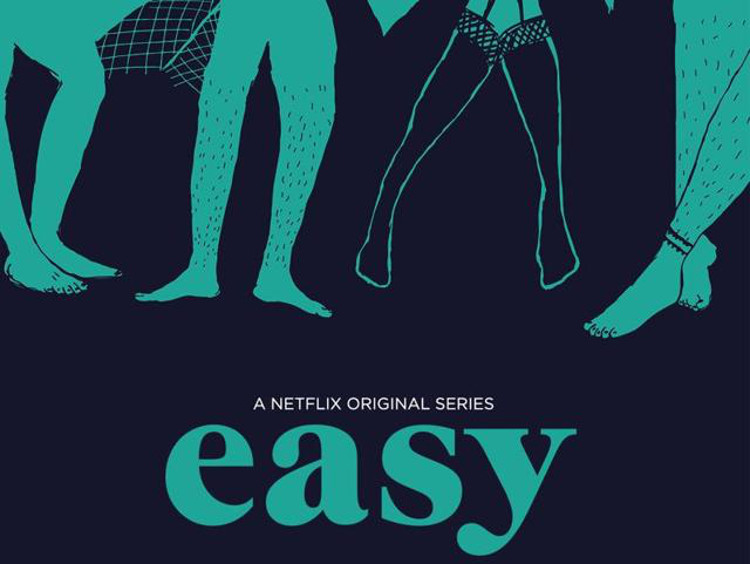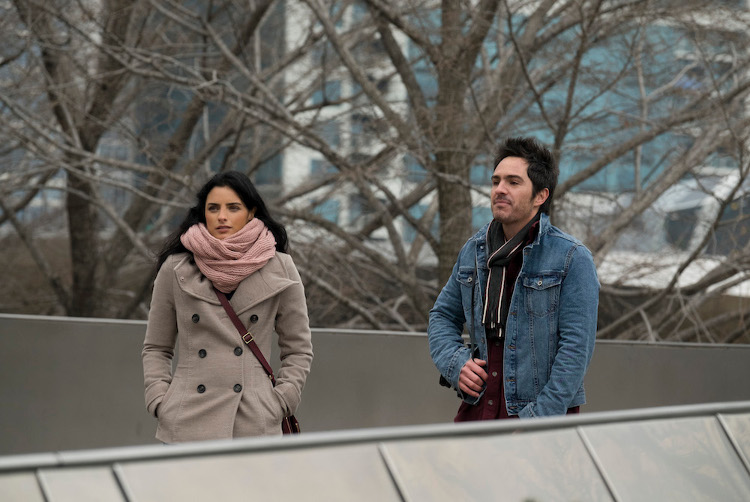Let’s Be Unambiguous, There’s No Middle Ground To Sexual Violence
I started watching a Netflix Original series called Easy last week. It’s self-described as an “anthology that follows diverse Chicagoans fumbling through the modern maze of love, sex, technology and culture” – each of the 8 stories in the series are told, perhaps ironically, with a focus on ambiguity – no episode is conclusive.
We’re introduced to the fledgling phase of a femme queer couple’s relationship as they negotiate opposing lifestyles and priorities (Ep.2), the competing interpretations of sexual expression between a middle-aged graphic novelist and a twentysomething digital artist (Ep.5) and a married couple experimenting with polyamory (ep 6).
Ostensibly, the series is offering a progressive insight into non-conventional relationships, lifestyles and belief systems, allowing the viewer to draw their own conclusions as to the future fate of each protagonist.
There is one area, however, in which director Joe Swanberg has failed spectacularly. In the series’ very first episode, depicting a sexually stagnant married couple’s day-to-day life, a troubling sex scene takes place. After a split second of foreplay, the husband is seen throwing his wife onto the bed, entering her from behind and finishing within about 30 seconds. He then promptly dresses himself and heads elsewhere without a solitary word uttered. The remainder of the scene illustrate the woman’s clear dissatisfaction, her feeling of objectification, her dismay at the absolute absence of any consultation as to her needs or desires at the expense of her husband’s instant gratification.

Rather than focus on the problematic nature of what had occurred, and explore the woman’s feelings after the event, the subsequent scene shows her husband waking the next morning in a beautiful room – pristine white sheets, a glorious sunlight bursting through the window to welcome him to a new day. His wife isn’t beside him, though – she, as we learn shortly afterwards, is downstairs, tending to her children, preparing a feast for all the family. Her husband emerges, triumphant, embracing his wife. And that’s pretty much how it ends.
[perfectpullquote align=”right” cite=”” link=”” color=”#8D3AF9″ class=”” size=””]It is an act of horrific sexual violence. And, disgustingly, it’s aestheticised.[/perfectpullquote]
If that narrative feels problematic, it’s hard to find suitable words for what is portrayed in the 4th instalment. We’re introduced to a married couple, Gabi and Bernardo, settled in Chicago but hailing from Mexico, who are surprised by the sudden arrival of an old friend, Martin, from back home.
He’s characterised as hedonistic,unpredictable and energetic, at odds with the couple he’s visiting who have settled for a quiet, suburban life. After dinner on his second night in town, the three agree to a night’s drinking and dancing. Before long, Gabi’s husband is making his excuses – he’s tired, apparently – and while he encourages her to stay out, he warns her not to drink excessively, “since we’re trying for a baby”. She’s naturally outraged by this remark and sends him on his way with a few choice words.
Fast forward a few hours and we see Gabi and Martin stumbling home from a nightclub. He tries to kiss her which she’s incredibly uncomfortable with, so she pushes him away. He tries again. She pushes him again. This sequence continues in the apartment and concludes with him raping her against the living room window. Despite protestations to the contrary from the director, along with several fans of the show online, this is in no way open to interpretation. It is an act of horrific sexual violence. And, disgustingly, it’s aestheticised.
When sexual violence is glamourised in this manner in ostensibly progressive series’ such as Easy, it perpetuates a rape culture that is prominent everywhere – even in the places we might least expect it – so-called safe spaces.

Since my teenage years, I’ve been involved primarily in two things – left activism/politics and underground music – from DIY hardcore punk in earlier years to a wider range now – but the commonality between each is their respective pride in existing as safe spaces; against misogyny, racism and queerphobia and in favour of equality, solidarity, creative freedom and crucially the freedom to exist and participate free of the threat of violence.
Despite this, I’ve experienced sexual violence. It exacerbated my anxiety tenfold, eroded both my self-esteem and trust in others, and wreaked havoc on my sex life. It led me to feel guilty, ashamed, dirty, even suicidal. Its consequences come and go in waves, and there are periods where everything is alright – but in the last month or so, for example, it’s been testing to say the least – I haven’t been at work in 5 weeks, have had minimal interaction with friends, sweated profusely for hours on end without explanation, and have counted myself lucky if I manage anything above an hour’s sleep.
[perfectpullquote align=”right” cite=”” link=”” color=”#8D3AF9″ class=”” size=””]Rape culture is prominent everywhere – even in the places we might least expect it – so-called safe spaces.[/perfectpullquote]
As harrowing as that all sounds, I have friends and comrades who have endured much worse, often from within our apparent safe spaces, and as each month passes, another story emerges. The former elected left-wing councillor and fervent “feminist ally” snuck out the back door of his party. The “affable” resident DJ in one of Dublin’s favourite alternative music bars. The lead singer and guitarist in multiple well liked DIY bands (one of whom, to be fair, kicked him out swiftly). Across the sea, in one of America’s most well established anarchist/punk scenes, the frontman of several bands and founder of a prolific, decades-old record label.
The shared outcome among the people outlined above is that, well, there isn’t one. They’ve all either carried on without consequence or hid away for a couple of months before re-emerging, unscathed. They’ve all, to varying degrees, been defended by people within the scenes to which they belong. I don’t personally know everyone who’s suffered as a result of these men’s actions, but it’s certain that none of them have been able to enjoy life as fruitfully as their abusers.
A question we desperately need to ask ourselves within these scenes is – can we call ourselves comrades or allies if we’re selective in the cases we speak out against? There’s no shortage of straight cis men calling out the abuse of Woody Allen, Bill Cosby or Johnny Depp, for example – and nor should there be. But it takes more than performatively tweeting your disgust at these celebrities thousands of miles away. It takes being willing to take people you actively admire or consider acquaintances to task on their behaviour and calling it out if it’s safe to do so.
Ambiguity is a luxury that scriptwriters and directors can afford to convey, but unlike those episodes of Easy, there’s nothing ambiguous about the after-effects of sexual violence. The untold narrative is one of relentless trauma. Apparently highlighting this reality is of less importance to Joe Swanberg than thematic consistency.
So let’s be unambiguous – there’s no middle ground and there’s never an excuse. If we’re ever going to eradicate rape culture, we need to start believing and supporting survivors – not as and when it suits our own environments, but always. Unconditionally.
We just need to be fucking better. All of us.
